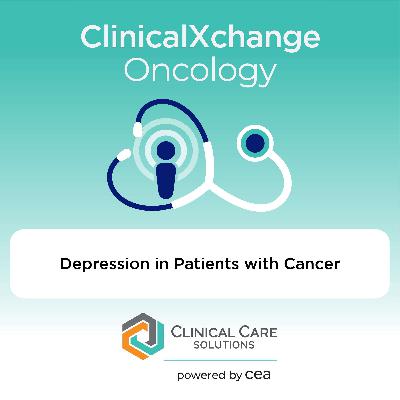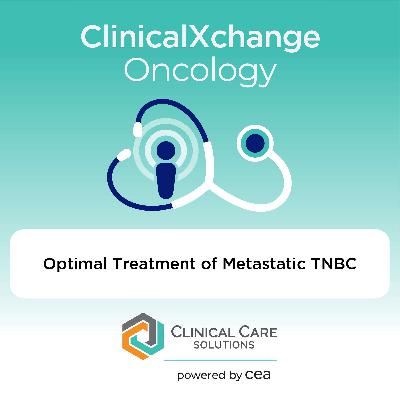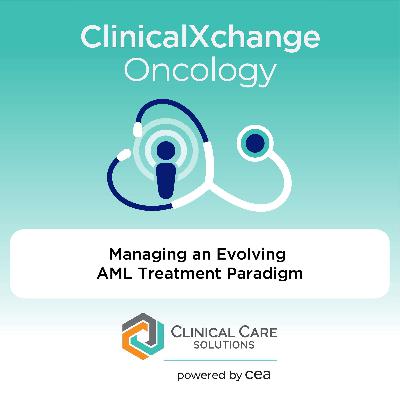Discover ClinicalXchange Oncology podcasts
ClinicalXchange Oncology podcasts

ClinicalXchange Oncology podcasts
Author: Clinical Care Solutions, CCS ClinicalXchange Oncology Podcast
Subscribed: 3Played: 22Subscribe
Share
© 2021 CCS ClinicalXchange Oncology Podcast
Description
Welcome to the Clinical Care Solutions Oncology podcast channel. Our podcast shows give you quick access to important content when you need it - at home, at your desk, or on the go.
4 Episodes
Reverse
This podcast provides an overview of current and emerging data available in the treatment of EGFR Exon 20 Insertion Mutation Non-Small Cell Lung Cancer, including updates from ESMO 2023. Key takeaways:
- Review treatment options for EGFR Exon 20 Insertion Mutations in NSCLC
- Review updated clinical data from ELCC and ESMO 2023
- Gain an understanding around the management of treatment-related Adverse Events
Presenter:Philip R. Muskin MD, MA, DLFAPAProfessor of PsychiatryColumbia University Irving Medical CenterSenior Consultant in Consultation-Liaison PsychiatryNew York-Presbyterian HospitalNew York, NYChronic medical illnesses such as cancer are characterized by a notably increased prevalence of depression. Furthermore, several challenges may arise in managing the depression in these patients, given their anti-cancer regimens. Here, we present a short learning module that will help clinicians better recognize and diagnose patients with cancer who may also have depression, as well as develop treatment plans tailored to their concomitant anti-cancer regimens.Follow along with the slideset located here:https://bit.ly/3Auicb2
Presenter:Hope S. Rugo MDProfessor of MedicineUniversity of CaliforniaSan Francisco Comprehensive Cancer CenterTNBC comprises approximately 15% of newly diagnosed breast cancer cases and is defined by being estrogen-receptor negative, progesterone-receptor negative, and human epidermal growth factor receptor 2-negative. This breast cancer subtype is very aggressive, with a median overall survival slightly greater than 1 year. Furthermore, treatment options are limited. New and innovative therapies are being evaluated in patients to improve their outcomes, including progression-free survival and time to deterioration in health-related quality of life. Here, we present an expert-led review on current standards of care, as well as novel and emerging treatment regimens that are in the pipeline for approval by the United States Food and Drug Administration and/or under investigation.Follow along with the slideset located here:https://bit.ly/3krD3Gj
Presenter:Gail J. Roboz MDProfessor of MedicineDirector, Clinical and Translational Leukemia ProgramWeill Medical College of Cornell UniversityNew York-Presbyterian HospitalNew York, New York, United StatesThis brief program will begin with a review of NCCN Guidelines® Recommendations for the treatment of AML in individuals 60 years of age or older. Next, the results of the BRIGHT AML 1003 trial comparing glasdegib + LDAC to LDAC alone, the VIALE-A trial comparing venetoclax + azacitidine vs azacitidine alone, and a comparison of CPX-351 vs standard of care cytarabine + daunorubicin (7 + 3 regimen) for induction and consolidation, will be reviewed. The faculty will discuss FLT3 and IDH inhibitor approvals for AML, IDK differentiation syndrome, and measuring MRD in AML. Finally, results of a trial examining oral azacitidine and a meta-analysis of 5 trials examining gemtuzumab ozogamicin will be reviewed.https://www.clinical-care.org/resource-center-details/using-available-evidence-and-guidelines-for-managing-an-evolving-aml-treatment-paradigmFollow along with the slideset located here:https://bit.ly/3lJNHYC







